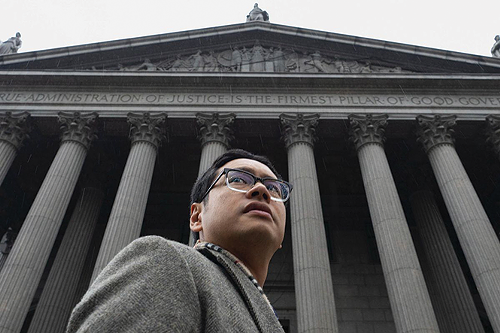Comfort Food
The Fight tells the ACLU documentary story people might want, but not necessarily the one they need.
By Scott Renshaw @scottrenshawThe 21st-century American political documentary is ... well, to say it's a fraught genre would be to engage in a metric shit-ton of understatement. Polarized public discourse manifests itself in movies that feel designed more to flatter their intended audience than to enlighten, or at the very least to enrage people into action. That phenomenon might be most obvious in the right-wing polemics churned out by Dinesh D'Souza, but while it's not remotely a "both sides" level of blatant garbage-spewing, the left isn't immune from shaping non-fiction films for comfort.
As a case in point, witness The Fight, the new documentary from the Weiner directing team of Josh Kriegman and Elyse Steinberg, along with Eli B. Despres. On its simplest level, it's a profile of the avalanche of cases undertaken by the American Civil Liberties Union during the Trump presidency, focusing on five ACLU attorneys with specific areas of specialty. Dealing with reproductive rights, Brigitte Amri takes on the government's attempt to prevent an undocumented immigrant minor in custody from getting an abortion. Immigration law expert Lee Gelernt addresses the policy of separating children from undocumented immigrant parents. Josh Block and Chase Strangio tackle the executive order banning transgender soldiers from the U.S. military. And Dale Ho brings his expertise in voting rights to bear on the question of whether the 2020 U.S. Census can include a question about citizenship status.
The Fight spends a lot of time laying out the specifics of the various cases at issue, and the challenges that might face ACLU attorneys in their attempts to get a positive outcome. In a way, that approach represents the fundamental structural problem with The Fight: It's a movie that wants to make excruciatingly clear that these lawyers are on the "correct" side of these issues. You, Gentle Reader, might happen to agree with our protagonists on all of the four examples mentioned above, but that's kind of beside the point. The problem is that making you feel righteous, while appealing, isn't dramatically interesting.
What's missing from The Fight is a recognition that what ACLU attorneys are fighting for makes for a less compelling story than why they're fighting for it, and what they sacrifice to do so. It's not entirely absent, as the filmmakers do provide glimpses into the way the attorneys' personal lives are disrupted by their work, or how many threatening hate messages they receive daily. There are tugs at the heartstrings when we see people whose lives have been made better by the ACLU winning its cases, but the best scenes in The Fight almost invariably involve getting to know the attorneys as individual people—like Dale Ho nervously practicing his opening statement before his first-ever appearance before the Supreme Court—rather than abstract representations of the ACLU's heroic efforts.
And things get even messier when The Fight has to deal with the fact that even if you're a dyed-in-the-wool liberal, you might not think every effort the ACLU makes is heroic. To the filmmakers' credit, they do address the fact that defending free speech rights sometimes means defending speakers of horrible things, manifested most recently—and controversially—in the ACLU's defense of the May 2017 "Unite the Right" white nationalist rally in Charlottesville, Virginia that left counter-protester Heather Heyer dead. But the way it's handled here feels like an obligatory "let's get this out of the way" rather than a genuine wrestling with the ACLU's complicated legacy. When The Fight shows an ACLU attorney expressing his opinion that it was the wrong call to defend "Unite the Right," it becomes clear that the film is missing the tension of an attorney fighting for a specific client even if they feel the client might be dangerously wrong. The harried lawyer fighting the U.S. government on behalf of a scared immigrant mom separated from her daughter is an easy hero to root for; someone fighting for a principle that even protects Nazis doesn't seem to fit the desired narrative.
The film we do get is undoubtedly a feel-good story, albeit one impacted by the realization that these many cases sometimes feel like fingers in the dike trying to prevent the flood of Trump administration hate and oppression. Is that the kind of story that tells the whole story of what it means to be an ACLU attorney? Or is it the kind of story that's just telling some of us what we want to hear?
More by Scott Renshaw
-
Film Reviews: New Releases for April 19
The Ministry of Ungentlemanly Warfare, Abigail, The Beast, Hard Miles, Sasquatch Sunset and more
- Apr 19, 2024
-
Faces of Salt Lake County book and portrait reception
Images and personal stories in a new book reveal local demographic diversity
- Apr 17, 2024
-
Feature film review: THE BEAST
A filmmaker's compelling ideas get a bit tangled in references to his creative influences.
- Apr 17, 2024
- More »




